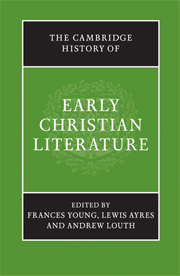Book contents
- Frontmatter
- PART ONE The Beginnings: The New Testament to Irenaeus
- PART TWO THE THIRD CENTURY
- PART THREE FOUNDATION OF A NEW CULTURE: FROM DIOCLETIAN TO CYRIL
- A LITERARY GUIDE
- 21 Classical genres in Christian guise; Christian genres in classical guise
- 22 Arnobius and Lactantius
- 23 Eusebius and the birth of church history
- 24 The fourth-century Alexandrians: Athanasius and Didymus
- 25 Palestine: Cyril of Jerusalem and Epiphanius
- 26 The Cappadocians
- 27 Fourth-century Latin writers: Hilary, Victorinus, Ambrosiaster, Ambrose
- 28 Jerome and Rufinus
- 29 Augustine
- 30 John Chrysostom and the Antiochene School to Theodoret of Cyrrhus
- 31 Cyril of Alexandria
- 32 Hagiography
- 33 Ephrem and the Syriac Tradition
- 34 The literature of the monastic movement
- 35 Women and words: texts by and about women
- 36 Conciliar records and canons
- B CONTEXT AND INTERPRETATION
- Bibliographies
- Index
- Map: The Roman Empire in the late fourth century AD"
- References
30 - John Chrysostom and the Antiochene School to Theodoret of Cyrrhus
from A - LITERARY GUIDE
Published online by Cambridge University Press: 28 March 2008
- Frontmatter
- PART ONE The Beginnings: The New Testament to Irenaeus
- PART TWO THE THIRD CENTURY
- PART THREE FOUNDATION OF A NEW CULTURE: FROM DIOCLETIAN TO CYRIL
- A LITERARY GUIDE
- 21 Classical genres in Christian guise; Christian genres in classical guise
- 22 Arnobius and Lactantius
- 23 Eusebius and the birth of church history
- 24 The fourth-century Alexandrians: Athanasius and Didymus
- 25 Palestine: Cyril of Jerusalem and Epiphanius
- 26 The Cappadocians
- 27 Fourth-century Latin writers: Hilary, Victorinus, Ambrosiaster, Ambrose
- 28 Jerome and Rufinus
- 29 Augustine
- 30 John Chrysostom and the Antiochene School to Theodoret of Cyrrhus
- 31 Cyril of Alexandria
- 32 Hagiography
- 33 Ephrem and the Syriac Tradition
- 34 The literature of the monastic movement
- 35 Women and words: texts by and about women
- 36 Conciliar records and canons
- B CONTEXT AND INTERPRETATION
- Bibliographies
- Index
- Map: The Roman Empire in the late fourth century AD"
- References
Summary
Antioch was one of the great cities of the Mediterranean world, ranking alongside Alexandria, Rome, Carthage and, after its foundation in 330, Constantinople. It had a large Jewish population, and was one of the earliest centres of Christianity outside Palestine: it was there that the term ‘Christian’ was first used (Acts II:26). It was mentioned, along with Alexandria and Rome, in canon 6 of the Council of Nicaea, as a city whose bishop had some form of primatial (later to be called patriarchal) authority. In addition to its civic and ecclesiastical pre-eminence, Antioch was a centre of learning, especially in rhetoric: according to Libanios, professor of rhetoric in Antioch from 354, Athens and Antioch ‘held aloft the torch of rhetoric’, Athens for Europe and Antioch for Asia. The traditions of paganism, too, were strong in Antioch, and not simply at a popular level: Libanios was notable in the late fourth century for his adherence to the old religion, and Julian the Apostate’s brief campaign to restore paganism was focused in Antioch where he was resident from the end of June 362 until 5 March 363, when he marched east against Persia – and to his death. The vernacular language of the hinterland of Antioch, reaching eastwards through Coele Syria to the river Euphrates and beyond, was Syriac, which by the end of the fourth century had developed its own rich Christian culture, which was not without influence on the Hellenistic culture of the Christians of Antioch.
- Type
- Chapter
- Information
- The Cambridge History of Early Christian Literature , pp. 342 - 352Publisher: Cambridge University PressPrint publication year: 2004
References
- 1
- Cited by

